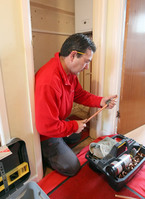Preventing condensing boiler breakdowns

With temperatures in Britain taking another dip this week, the coldest winter for 100 years seems unwilling to leave just yet.
A knock-on effect of these sub-zero temperatures is the vast number of homeowners who have experienced problems with their boilers over the winter months, with call-outs to npower hometeam soaring by 80%. As a result npower hometeam, which installs, services and repairs boilers, is issuing advice to homeowners to prevent pipes from freezing and overworked boilers from malfunctioning.
Condensing boilers are standard in the UK, working 10-20% more efficiently than the regular non-condensing models. However, the process by which waste gases are converted into water can leave systems prone to freezing, which can cause a breakdown.
Joan Coe, marketing manager for npower hometeam, comments: “This winter has been particularly bad for boiler breakdowns as people are running their boilers at full capacity for longer periods of time, which often exposes an underlying problem. Here are our top tips on how to maintain a condensing boiler:
1. Preventing a freeze up
“The Heating and Hotwater Industry Council (HHIC) states that temporarily setting the heating timer/room thermostat to continuous is one way to prevent the condensate pipe from freezing up.
“During cold weather it is often more efficient to keep your heating on low constantly, rather than running it at full capacity at intervals throughout the day. This keeps the system at a constant warm temperature and prevents freezing.
2. Thawing a condensate pipe
“If it’s too late to implement our first tip, here’s what to do! If the temperature outside is below freezing and your condensing boiler is not working, or is displaying an error message or flashing light, then it is possible your condensate pipe is frozen.
“Locate the condensate pipe (often found externally) and thaw it by placing a hot water bottle on the pipe or pouring warm water on the pipe. Then simply reset your boiler.
3. Long-term solutions
“If you are concerned that your condensate pipe is liable to freezing frequently, then it might be possible to relocate the pipe internally. You could also have your condensate pipe replaced with one that is of a wider diameter, as this will also reduce the chances of it freezing. Try installing lagging round the pipe to insulate it; a professional can fit this for you or can purchase yourself from a DIY or home improvement store.
4. Keeping your boiler maintained
“Ensure your boiler is properly maintained throughout the year to avoid encountering problems during the winter when you need it most. An annual service will ensure your boiler is operating both efficiently and safely.”
Joan adds: “If customers experience a boiler breakdown caused by a frozen condensate pipe, they can call us and we will talk them through the measures above to resolve the problem as quickly as possible. If, however, the problem persists we will then send out an engineer to get the boiler up and running. By following these simple tips and being more informed about how condensing boilers work, we hope that homeowners will be better prepared should they find themselves in this situation in the future.”
For customers who want to protect their boiler all year round, npower offers a pioneering new boiler and central heating care service called npower hometeam 50. From just £10.50 a month, you can buy peace of mind should anything go wrong.
What’s more, if the customer doesn’t need to call out npower’s hometeam to work on their boiler or central heating during the 12 month care plan, npower will automatically return 50% of the annual cost on their one year anniversary.
hometeam 50 also includes an annual boiler service, usually worth £75.57, meaning customers will get the reassurance of care for 12 months AND a service, and could still receive their 50% cash back if they don’t call out npower during that year.
You don’t even need to be an npower energy customer to sign up to hometeam 50 boiler and central heating care.
For more details of npower hometeam’s new boiler installations or hometeam 50, visitnpower.com/hometeam.

